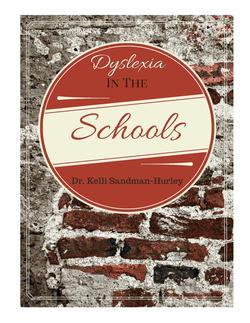
 Dr. Kelli Sandman-Hurley has created a FREE online resource, Dyslexia in the Schools, for any parents who wants information on how to work with the school to get help for their child with dyslexia. This free e-book is only 23 pages long but it is packed with helpful information. Click here to download your copy.
2 Comments
 When it comes to reading, the research is clear: the child who gets behind in reading progress, stays behind. There is no evidence to suggest that a child will "mature" or "catch up" to his peers, if we "wait and see." Waiting will not allow that child to catch up. Immediate intervention is needed. According to Dr. Sally Shaywitz, "Kindergarten is in many ways a watershed in identifying children who are vulnerable to dyslexia." Parents and teachers should closely monitor a child's progress in learning to read, beginning no later than kindergarten. Many schools now routinely screen every kindergartner when they register or near the beginning of the year. If a child's results put him in the lowest 20-30%, he is considered "at risk" for reading failure. Schools ideally should provide classroom, group or individual interventions to these children. As a parent, you should ask where your child falls and if she is at risk, ask what the school is specifically doing to address it. According to Dr. Reid Lyon, research psychologist and Chief of Child Development and Behavior Branch at the National Institute of Child Health and Human Development (NICHD), "Most children can learn to read if difficulties are detected in kindergarten and first grade and the appropriate early interventions are applied. Prevention and early intervention programs that teach phoneme awareness and phonics skills and develop reading contexts where children have an opportunity to practice skills are more beneficial than approaches that are less structured and direct. Help needs to be provided before nine years of age; after that time, children respond more poorly to reading instruction." The moral of the story? Don't wait, see and hope. Address your child's reading struggles now by learning all you can about what he needs, what help he is getting, and what else might need to be done.  You have concerns about your child's reading progress. You've noted that she has some of the signs of dyslexia. According to experts, if reading is not progressing, these signs should not be ignored. What should you do now? Schedule a meeting with the school. Sally Shaywitz, M.D., Co-Director of the Yale Center for Dyslexia and Creativity, urges parents to schedule a meeting with their child's teacher without delay. In her book, Overcoming Dyslexia, the occurrence of a number of problems over a period of time, a persistent pattern, represents a likelihood of dyslexia. Don't fall victim to wishful thinking. Shaywitz warns, "It is wishful thinking to believe there will be a sudden, magical improvement." Schools and parents often want to take a "wait and see" approach. (Why don't we wait until after the holidays? Let's see how she's doing at the end of the year.) "Remember," says Shaywitz, "scientific data show that reading problems are persistent: they do not represent a lag in development." Make a written list of your observations and concerns. Shaywitz advises writing down the concerns, as a help for both parent and teacher. "Parents are often so nervous when speaking to their child's teacher, that they forget why they were worried." A list, Shaywitz says, will help both the parent and be appreciated by the teacher. Along with that list, Shaywitz offers a meeting checklist that parents can use to help get as much detailed information as possible. Next: The school meeting checklist.  Your child is having unexpected difficulty with reading, and struggling with school. He seems to have hit a "wall" in third grade, or he hasn't learned to read simple words in first grade and it's the end of the year. Despite the teacher's reassurance not to worry and that, "he'll grow out of it," you are concerned that it might be something more. How can a parent begin to find out if this is the case? The following blog series will offer step-by-step advice on what parents can do to find out what is going on with your child and what you can do to help them. Step 1: Research dyslexia and learn as much as you can before you decide what to do next. Before diving into talking with the school, or calling the phone number of someone you've found on the web, take the time to do some research and learn what you can. Then, you will be better prepared and know what to ask when you begin to talk with others. Here are a few suggestions:
Next: How to get specific information from the school on exactly how well your child is reading. |
AuthorHello, I'm Janet Menosky Smith. I am a Reading Specialist and Orton-Gillingham trained tutor, helping students with reading difficulties. This blog is dedicated to providing information, resources and encouragement to families and others seeking to help struggling readers. Archives
March 2018
Categories
All
|


 RSS Feed
RSS Feed